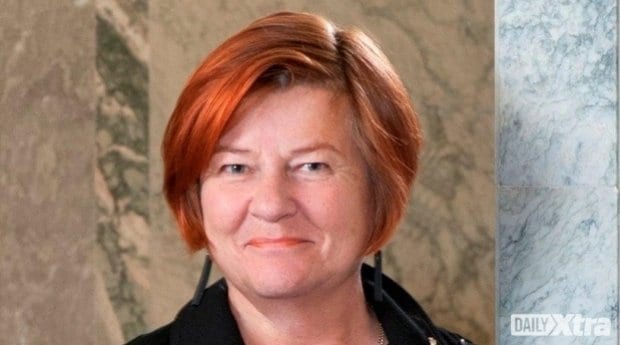The Alberta bill that would have somewhat backed students trying to form gay-straight alliances (GSAs) in schools reluctant to support them has been shelved temporarily.
Alberta Premier Jim Prentice postponed third reading of Bill 10: An Act to Amend the Alberta Bill of Rights to Protect our Children, on Dec 4. In addition to supporting GSAs, the bill would have added sexual orientation to the Alberta Bill of Rights and repealed Section 11.1 of the Alberta Human Rights Act, which currently allows parents to remove their children from classes that deal with sexuality, sexual orientation and religion.
“At present, there is clearly no consensus in Alberta on either the constitutionality or, indeed, the wisdom of the provincial government mandating gay-straight alliances in schools,” Prentice told a press conference. “The issue was polarizing to begin with and has become even more so over the past several days.”
Prentice says the bill is on hold, “pending further consultation with Albertans.” He declined to specify the government’s next move.
At the centre of the Bill 10 debate is the provision that says students who are denied permission to form GSAs by their schools and school boards would be accommodated by the Ministry of Education, which would provide them with GSAs. There is no guarantee, however, that the GSA would be on school grounds.
“Either the GSA is in the school or it’s not in the school,” Alberta NDP Leader Rachel Notley told the legislature on Dec 3. “If the GSA is meeting across the street in the 7-Eleven parking lot, it is being treated differently than the other school clubs. The kids who have been bullied, who are desperately seeking support and remediation from that bullying, are being treated differently than kids in other school clubs.”
Bill 10 replaces Bill 202, the Safe and Inclusive School Act, which was introduced by Alberta Liberal MLA Laurie Blakeman on Nov 17. That bill would have amended the Alberta Education Act to require that all school boards support GSAs and would have repealed Section 11.1 of the Alberta Human Rights Act.
Blakeman says the government’s “watered down” response to her bill is “backstopping” Catholic schools. “The primary thing is the government is insisting on allowing faith-based schools to not have to follow the Charter, and that’s not acceptable to me,” she says.
“It’s the Catholic schools that will not allow GSAs — they just won’t,” she says. “They have these lovely little special statements, but when they are actually faced with why they don’t give kids a GSA they say it exploits kids because it points out that they are different. If you ask for a GSA in a public school you will get it, but in a Catholic school you will not get it. That’s segregation.”
In November 2012, at a meeting of the Alberta School Boards Association, a majority of boards rejected a proposal to encourage all districts to create safe and supportive environments for queer students. A majority of public and francophone districts voted in favour of the resolution, but every Catholic school district in attendance voted against it.
The Alberta Catholic School Trustees’ Association website includes a document titled “A Resource for an Inclusive Community — A Teacher’s Guide for and About Persons with Same Sex Attractions.” The document, developed by bishops as an aid to teaching part of the curriculum in Catholic schools, describes “homosexual orientation” as “intrinsically disordered” and same-sex genital acts as “immoral.”
“Although the particular inclination of the homosexual person is not a sin, it is a more or less strong tendency ordered toward an intrinsic moral evil; and thus the inclination itself must be seen as an objective disorder,” the document states.
Kris Wells, director of programs and services at the University of Alberta’s Institute for Sexual Minority Studies and Services, says that GSAs are a proven and effective intervention strategy and that resistance to their implementation fosters a culture of intolerance and segregation.
“The roadblock is institutionalized religion and bishops who are basically telling and directing our elected school trustees what to do, which is fundamentally undemocratic,” he says. “If bishops are directing educational policy, then we shouldn’t be funding religious schools with public dollars.”
Wells believes the government has “radically misjudged” the values and views of Albertans.
“We’re a young province, and the average age now is 36,” he says. “What we see is a disconnect of values and beliefs of that generation in power — namely our school administrators, trustees and elected officials — and a younger generation of youth wanting to build an open and inclusive society for the future.”
Blakeman says that public support for her bill prompted the government to respond to the issues it raised. “They never would have brought this topic up in a million years if it wasn’t for my private member’s bill,” she says. “I worked with the community and did a series of videos explaining what my bill was about. I asked people for support, and then the minority religious schools went crazy to lobby against me, but Albertans came through.”
Calgary MLA Sandra Jansen, who sponsored Bill 10, did not respond to Xtra’s requests for comment.
An earlier version of the bill would have allowed students to appeal school board rejections of GSAs through the Court of Queen’s Bench, rather than seek accommodation through the Ministry of Education.

 Why you can trust Xtra
Why you can trust Xtra


